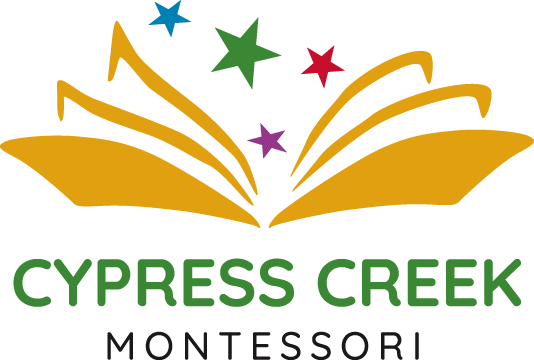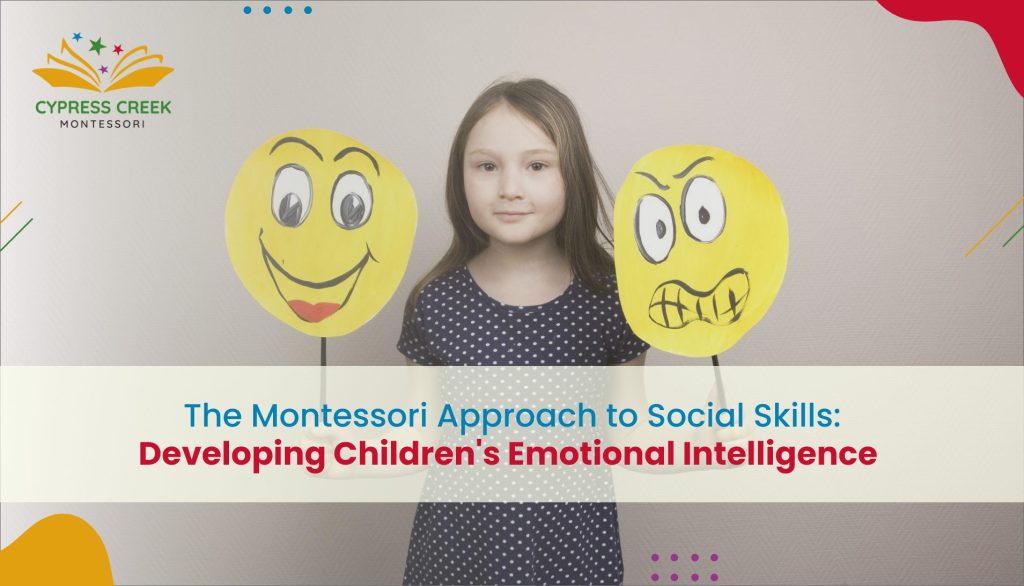Dr. Maria Montessori believed that education should focus on academic achievement and the development of the whole child, including their social and emotional well-being.
The Montessori approach is an early childhood education. It depends on the idea that children learn fastest when free to explore and learn in a caring environment that stimulates their natural curiosity and interests. Cypress Creek Frisco Montessori’s approach emphasizes hands-on learning, individualized instruction, and respect for the child’s autonomy and independence. UNESCO recognizes the Montessori method as a practical educational approach.
Research shows that children with strong social skills and emotional intelligence are better equipped to handle challenges, build positive relationships, and succeed academically and professionally. We aim to provide parents with satisfaction and their child development with valuable insights and practical tips for promoting social and emotional growth in children.
Montessori Principles for Social-Emotional Learning
The Montessori approach to education is a child-centered method that emphasizes learning through exploration, discovery, and hands-on experiences. The teacher provides guidance and support when needed and promotes a positive and supportive learning environment that encourages social skills and emotional intelligence. Over 5,000 Montessori schools in the United States serve over 300,000 students from preschool through high school.
Developing Emotional Intelligence in Montessori
Developing emotional intelligence is crucial for children’s overall well-being and success, as it helps them manage stress, build positive relationships, and make responsible decisions. We support children’s emotional intelligence, including creating a safe and supportive environment, teaching self-regulation strategies, encouraging self-expression, and modeling healthy emotional regulation. Our classrooms promote Montessori education and emotional intelligence through grace and courtesy lessons, practical life activities, mindfulness, meditation, and group work.
Social Skills in Montessori
We value developing social skills for children, which directly impacts their well-being and success. Children with strong social skills can better form positive relationships, manage conflicts, and succeed academically and professionally. We support children with social skills development, including modeling positive social skills, providing opportunities for social interaction, providing feedback, and encouraging self-reflection. Montessori classrooms provide a variety of activities that promote social skills, such as mixed-age group work, circle time, practical life activities, and role-play and drama.
Benefits of the Montessori Approach to Social Skills
The Montessori strategy promotes improved self-awareness and self-regulation, better communication and collaboration skills, increased empathy and respect for others, and a greater sense of community and belonging. This is achieved through mixed-age group work, practical life activities, and activities encouraging children to understand and appreciate different perspectives and backgrounds. These skills are essential for developing emotional and social intelligence and help children succeed academically and professionally.
Challenges and Limitations of the Montessori Approach
The Montessori approach to education emphasizes self-directed learning and may only be suitable for some children due to its lack of structure and guidance. Implementing this approach in traditional school settings can also be challenging, requiring a different teaching and learning approach.
Final thoughts: Developing Children’s Emotional Intelligence
Montessori techniques emphasize social skills and emotional intelligence through mixed-age group work, practical life activities, self-awareness, and self-regulation. This method promotes improved communication, collaboration, empathy, respect for others, and a sense of community and belonging.
Social skills and emotional intelligence are essential for children’s well-being and success and should be prioritized in education. Despite its limitations and challenges, the Montessori approach provides a unique and effective way to foster these skills in children.
Nourish Your Child’s Emotional Intelligence at Cypress Creek Frisco Montessori!
We feel proud to say that we are the best Montessori schools in Frisco, which use an excellent approach for Montessori schooling that emphasizes the development of your child’s emotional intelligence through a child-centered, hands-on learning experience.
At Cypress Creek Frisco Montessori, developing your child’s emotional intelligence is as important as academic achievement. Our best Montessori school loves to provide a nurturing and supportive atmosphere that fosters your child’s social and emotional growth. By choosing Cypress Creek Frisco Montessori for your child, you invest in their future success and happiness.
A bright future for your child is just one call away; get in touch and schedule your tour now!

